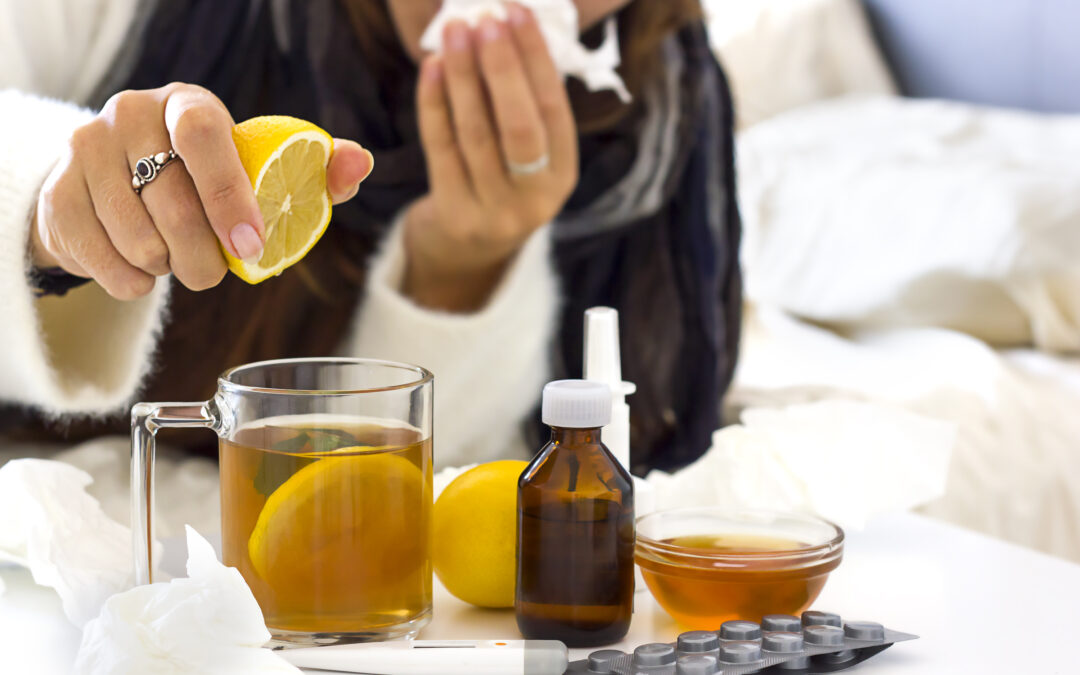As the days get shorter, temperatures drop, and we spend more time indoors, the peak season for colds and flu begins. Respiratory infections are particularly common in the fall and winter months.
While at the peak of the past winter season 2024/25, well over two million people sought medical treatment for acute respiratory diseases in just one week, this number dropped to a minimum of around half a million during the summer months. This data shows that respiratory infections play a significantly bigger role in the colder months.
In the case of acute respiratory diseases, it is important to distinguish between a cold (flu-like infection) and the flu (influenza), as the two diseases differ in their progression, symptoms, and risks.
A cold is usually harmless and is caused by various viruses such as rhinoviruses. Typical symptoms include a stuffy or runny nose, sore throat, cough, and mild fever or fatigue. The course is usually mild and the symptoms subside within a few days to about a week. Rest, adequate fluid intake, and symptom-relieving measures such as nasal sprays or pain-relieving medication usually help. Antibiotics are generally not effective, as these are viral infections. However, if you suspect you have the flu or a severe form of the illness, you should seek medical advice, especially if you have a high fever, shortness of breath, or pre-existing conditions.
Influenza, on the other hand, is caused by influenza viruses and often begins suddenly with high fever, severe malaise, muscle and joint pain, and dry cough. Especially in older people and those with chronic diseases or weakened immune systems, influenza can be severe and lead to complications such as pneumonia or heart muscle inflammation. In addition to preventive vaccination, early treatment also plays an important role: if therapy is started in time—ideally within the first 48 hours after the onset of symptoms—antiviral drugs such as oseltamivir or zanamivir can shorten the course of the disease and reduce complications.
Both diseases are mainly transmitted through droplet infection, i.e. when speaking, coughing, or sneezing. Aerosols (tiny droplets suspended in the air) can also lead to infection in poorly ventilated indoor spaces. Another possibility is smear infection: if an infected person gets viruses on their hands, for example when blowing their nose, and then touches door handles, light switches, or handrails on buses and trains, other people can become infected if they touch these surfaces and then touch their face.
The best prevention is a combination of hygiene measures, a healthy lifestyle, and vaccination. Washing your hands regularly and thoroughly with soap and water helps to reduce the viral load, especially when getting home, before eating, and after blowing your nose. If you need to cough or sneeze, you should do so into your elbow and dispose of used tissues immediately. It is also important to ventilate indoor spaces regularly to reduce virus-containing aerosols. Opening all windows wide several times a day for a few minutes is particularly effective during the heating season. In addition, it may be advisable to avoid crowds in poorly ventilated rooms or to wear a mask in certain situations, such as on public transportation.
The annual flu vaccination, which is recommended in Germany by the Standing Committee on Vaccination (STIKO) especially for risk groups, is also particularly useful. These include people aged 60 and over, pregnant women, the chronically ill, and medical staff. The vaccination is ideally administered in the fall so that immunity is built up in time for the start of the flu season.
In addition to the flu and flu-like infections, COVID-19 continues to play a role. Infection rates also rise significantly during certain seasons and, similar to the flu, can cause serious complications, especially in vulnerable individuals. However, autumn and winter do not necessarily have to be a time of illness. With a strong immune system, a healthy diet, sufficient exercise, and fresh air, you can actively contribute to its prevention. And if you do fall ill, self-monitoring and timely recognition of warning signs will help to avoid complications.
The mediteo app can help you keep track of your health. For example, it reminds you of important vaccination appointments or helps you organize your medication clearly in case of illness.
Sources
-
Muthuri SG, et al. (2014). The Lancet Respiratory Medicine. https://doi.org/10.1016/S2213-2600(14)70041-4
-
ECDC (2023): Factsheet Influenza. https://www.ecdc.europa.eu/en/seasonal-influenza/facts/factsheet
-
BMG (2022): Bundesministerium für Gesundheit. „Hygiene-Tipps.“ https://www.infektionsschutz.de/hygienetipps/
-
STIKO (2024): Empfehlung zur Influenzaimpfung 2024/25. https://www.rki.de/DE/Content/Kommissionen/STIKO/Empfehlungen/Influenza.html
-
DEGAM (2023): Deutsche Gesellschaft für Allgemeinmedizin und Familienmedizin. „Leitlinie Husten.“ https://www.degam.de/leitlinien-detail/18
Back to the Blog.

